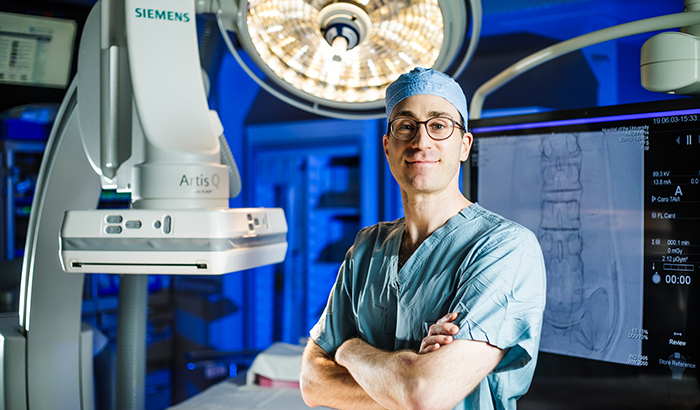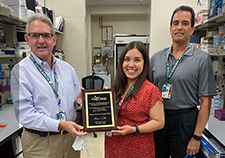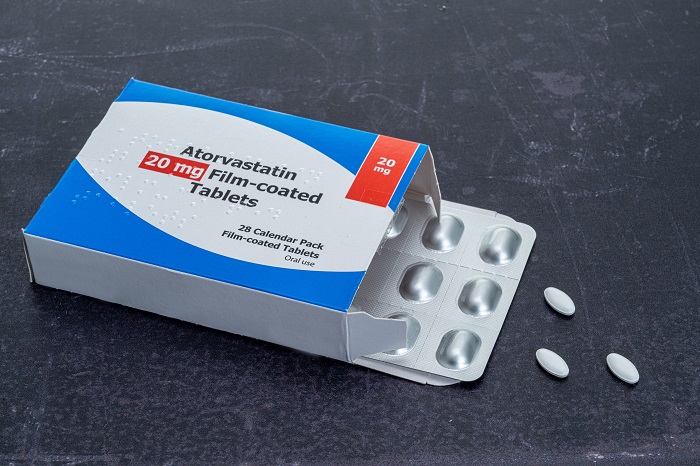Office of Research & Development |
 |


Dr. Scott Damrauer, shown above, with VA and the University of Pennsylvania, together with Dr. Philip Tsao at the VA Palo Alto Healthcare System and Stanford University, led a team investigating the genetic underpinnings of peripheral artery disease. They used data from VA’s Million Veteran Program. (Photo by Tommy Leonardi)
July 18, 2019
"We were able to identify the genes most responsible for causing PAD and begin to understand what differentiates atherosclerosis in the arteries of the legs from that in the arteries of the heart or brain."
As many as 12 million Americans suffer from peripheral artery disease (PAD), narrowing of the arteries serving the legs that can cause pain and difficulty walking, and even lead to ulcer formation, gangrene and amputation. The condition results from atherosclerosis, or clogged arteries, but until now, scientists lacked information about why some PAD patients develop problems with their legs, whereas others experience heart problems or strokes.
In a study published online July 8, 2019, in Nature Medicine, researchers from several institutions, including the Corporal Michael J. Crescenz VA Medical Center in Philadelphia and the Perelman School of Medicine at the University of Pennsylvania, studied the genetic characteristics of 31,300 veterans with PAD and identified 19 genetic markers – 18 of which were not previously reported.

VA Study Documents Health Risks for Burn Pit Exposures

VA center training the next generation of researchers in blood clots and inflammation

Could cholesterol medicine reduce dementia risk in seniors?
“By using data from the VA Million Veteran Program, we were able to identify the genes most responsible for causing PAD and begin to understand what differentiates atherosclerosis in the arteries of the legs from that in the arteries of the heart or brain,” said Dr. Scott Damrauer, a vascular surgeon at the Crescenz VA and assistant professor of surgery at the Perelman School of Medicine, who co-led the work. “These findings should lay the groundwork to develop new approaches towards treating PAD that can help to save both the lives and limbs of patients with PAD.”
Dr. Philip Tsao, an investigator at the VA Palo Alto Healthcare System and a professor at Stanford University School of Medicine, who oversaw the study along with Damrauer, added: “This work would not have been possible without the generosity of the Veteran participants of MVP.”
Atherosclerosis, or fatty deposits on the artery walls, is most often associated with heart attacks and strokes, but PAD is another common manifestation. It occurs when fatty deposits build up in the arteries, reducing their ability to supply blood and oxygen to the legs and feet. The entire circulatory system, including the heart and brain, is at risk when arteries are blocked and narrowed. The reduced circulation in PAD is associated with limb problems ranging from pain with walking to amputation, and frequently requires invasive procedures to open up or bypass clogged arteries.
To learn more about the genetic signature of PAD, the team used data from the VA Million Veteran Program (MVP), which links biospecimens and DNA from Veteran volunteers to their electronic health records. About 10% of those aged 55 or older seeking care in the VA health care system have PAD. MVP is the largest biobank of people with the condition, in addition to now being one of the world’s largest genomic databases in general, with more than 750,000 enrolled Veterans.
In the VA-funded study, among other findings, the researchers uncovered a link between PAD and a gene mutation called Factor 5 Leiden. Factor 5 Leiden is the most common inherited cause of blood clots in the venous system, but had not been previously known to play a role in diseases of the arteries. The researchers say the findings, coupled with results from other studies, suggests the need to rethink the role of blood clots and atherosclerosis in PAD. The study could point the way to new treatment approaches for Veterans and others with PAD.
“By better understanding the genetics of PAD we can begin to think about how to repurpose existing drugs and develop new drugs to treat PAD so that fewer people need operations to treat their disease,” said Dr. Derek Klarin, the study’s lead author. He worked on the project as a surgical resident at Massachusetts General Hospital and is now a vascular surgery fellow at the University of Florida.
Adapted from a write-up from the Perelman School of Medicine at the University of Pennsylvania.
VA Research Currents archives || Sign up for VA Research updates